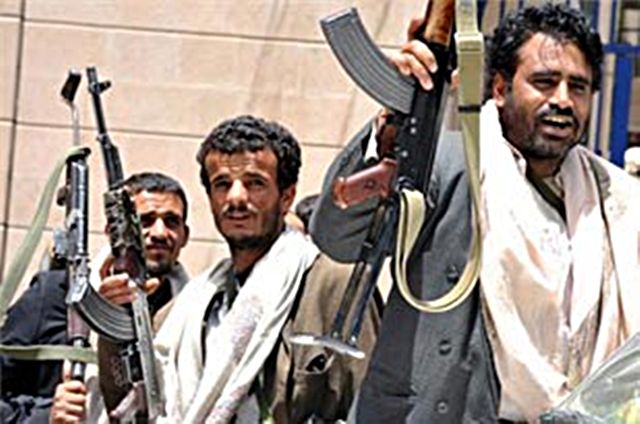
The Battle for Zinjibar: The Tribes of Yemen’s Abyan Governorate Join the Fight against Islamist Militancy
The Battle for Zinjibar: The Tribes of Yemen’s Abyan Governorate Join the Fight against Islamist Militancy
As if Yemen did not already face enough political, social and economic challenges in the midst of a multi-sided civil war, there are significant and not unreasonable fears in the Yemeni opposition that President Ali Abdullah Saleh has manufactured a new conflict between the state and al-Qaeda in Abyan governorate designed to ensure Western support for his continued rule. Many Yemeni political and military leaders insist the bitter and ongoing battle for the coastal city of Zinjibar (capital of Abyan governorate) is merely the culmination of a decade long policy of manipulating the al-Qaeda threat.
Yemen’s military is badly divided at the moment; some units and commanders have crossed over to the opposition, some units are engaged with Huthist rebels in northern Yemen, some (such as the Republican Guard) are devoted to crushing protestors, and still others, such as the leadership of the embattled 25th Brigade in Zinjibar, say they are neither pro- nor anti-regime, but will fight to the death to prevent an al-Qaeda takeover.
Saleh’s regime has attempted to capitalize on the seizure of Zinjibar as a warning of what can result from the instability sweeping Yemen as a result of anti-regime protests, describing the militants as “members of al-Qaeda [who] benefit from any instability to establish their Islamic state (Yemen Times, June 2).
The Islamist Takeover of Zinjibar: Betrayal at the Top?
According to official reports, Zinjibar was taken by about 300 Islamist militants (which the government identified as al-Qaeda) in late May after two days of fighting with government forces (AFP, May 29). Residents of Zinjibar reached by Western media provided a different version of events, describing a city abandoned to militants who went on a looting spree (BBC, May 29). Only the 25th Brigade refused to evacuate the city and was soon surrounded by militant forces. It seems that the original 300 militants received substantial reinforcements before tribal forces recently began cutting the roads into Zinjibar.
Not long after the occupation, reports began to appear in the jihadist forums of the proclamation of an “Islamic Emirate of Abyan,” as declared by AQAP (Ansar1.info, March 28; al-Bawaba, March 31). The forces in Zinjibar, however, are gathered under the banner of the newly formed Ansar al-Shari’a (al-Watan [Sana’a], August 4). The exact identity of the Islamist forces in Zinjibar remains uncertain. Al-Qaeda in the Arabian Peninsula (AQAP) has not issued any statements regarding the fighting there, though government statements routinely refer to the forces occupying the city as “al-Qaeda.”
Yemen’s foreign minister, Abu-Bakr al-Qirbi, strongly denied suggestions that the government was using al-Qaeda in Zinjibar to further its own interests and collect Western funding intended for anti-terrorism activities: “It cannot be said that the state that spares no effort in fighting [al-Qaeda], is the one that planted it there” (al-Sharq al-Awsat, July 29).
Perhaps reflecting the level of suspicion that surrounds the Saleh regime, some commentators in Yemen’s press have rejected the notion that al-Qaeda has anything to do with the events in Abyan (al-Masdar [Sana’a], July 26). Ali Nasir Muhammad, a leading figure in the separatist Southern Mobility Movement (SMM), views the seizure of Zinjibar by Islamist militants as part of an effort to create international concern over the future of south Yemen, tarnishing in the process “the image of the southern peaceful struggle” (Ma’rib Press, July 27). Meanwhile, the Abyan Forum for Reconciliation, Tolerance and Solidarity denounced the “suspicious alliance” between the army and al-Qaeda, which it suggested was impeding “any victory over terrorism” (Aden Press Online, July 31).
The 25th Mechanized Brigade Besieged
General Muhammad al-Sawmali, commander of the 25th Mechanized Brigade, based on the east side of Zinjibar, has been steadfast in his refusal to abandon Zinjibar in the fashion of the other security services and military units based there. The General caustically remarked: “God bless our colleagues in the Public Security, Police, and Central Security who pulled out of the governorate and left behind all their military equipment and munitions as a gift for al-Qaeda elements… I do not want to go too far and accuse my colleagues of complicity with al-Qaeda against us and I do not cast doubt about them… but we can say that it is cowardice and fear that filled them after the governor, his deputies, and directors of departments left Zinjibar” (al-Sharq al-Awsat, July 27).
The 25th Brigade is considered a close ally of Major General Ali Muhsin Saleh al-Ahmar, a powerful commander in the Yemen Army who has thrown his lot in with the opposition. In May, Ali Muhsin joined eight other generals in issuing “Statement Number One,” in which the generals accused the President of “surrendering Abyan [Governorate] to an armed terrorist group” (iloubnan.info – May 29, 2011; AFP, May 29; see also Terrorism Monitor Brief, June 17). An intensified effort by militants to drive the Brigade from Zinjibar began on May 30. Despite serious shortages of food and water in his garrison, the general maintains that his brigade’s “national, religious and moral duty to our God, homeland and governorate” do not permit his force to evacuate from Zinjibar (al-Sharq al-Awsat, July 27).
The Tribes Join the Battle
AQAP was once clearly subordinate to the tribes in the Yemeni power structure, but the occupation of Zinjibar by AQAP-allied militants and the flight of tens of thousands of refugees brought about a realization that the militants were now willing to operate independently of the approval or interests of the tribes. Only days before the tribal intervention in Zinjibar, Yemen’s embassy in Washington claimed that AQAP had only been able to expand its operations in Abyan through the efforts of tribal elders who had offered the militants shelter and protection while refusing to cooperate with government security units (Yemen Post, July 10).
The tribal intervention began when tribal leaders such as Shaykh Abdullah Bal’idi of Abyan’s Bal’id tribe called on members of all the local tribes, especially the locally powerful al-Fadl tribe, to unite against the Islamist militants (Akhbar al-Yawm [Sana’a], July 6). The shaykh’s appeal came from concern for local security, as he pointed out many of the militants were actually natives of Ma’rib and Shabwah governorates. Shaykh Abdullah also accused the authorities of having an interest in prolonging the fighting in Abyan (al-Watan [Sana’a], August 4). Some of the Islamists were reported to have arrived from abroad via Aden Airport as tourists before joining the ranks of the Ansar al-Shari’a (al-Hayat, August 1). General al-Sawmali maintains that many of the Islamist reinforcements in Zinjibar have arrived from Egypt, Saudi Arabia and Somalia. He described his opponents as “scattered groups from various areas or even from various countries whose concern is to kill. They use religion as a tool while some of them are ignorant to a large extent concerning religion. Some of them are extremists and others are tribal elements that have no objective. They do not have a clear objective or a clear leadership. Many of them are children who have enthusiasm to fight, and some of them have been bought by money” (al-Sharq al-Awsat, July 27).
By mid-July, tribesmen in the Abyan towns of Mudiyah, Mehfed and Ja’ar began pushing the militants out of their towns after seeing the devastation wrought in Zinjibar and witnessing the murder of tribesmen affiliated with the security forces (AFP, July 17).
On July 17, the Yemen Army launched an offensive involving troops from the 119th Brigade (based in Lahj governorate), armor and rocket launchers designed to relieve the 25th Brigade, supported by rocket attacks from naval ships offshore (Reuters, July 17). The offensive, which approached Zinjibar from the west, was joined by roughly 450 tribesmen.
One tribal leader, Shaykh Ahmad al-Rahwi, suggested that the tribesmen were uniquely qualified through local knowledge and traditional fighting techniques to engage and defeat the militants in the same type of guerrilla warfare the militants use (Yemen Online, July 15). In this matter the shaykh has the agreement of the 25th Brigade’s General al-Sawmali: “We want these tribes to assume their role in the war against al-Qaeda because the people of the area are aware of the circumstances of their area better than the regular forces. They can also distinguish between the armed men and they know from where they have come and to which tribes they belong” (al-Sharq al-Awsat, July 27).
Yemen’s Defense Ministry claimed two prominent al-Qaeda operatives, Ayid al-Shabwani and Awad Muhammad Saleh al-Shabwani, were killed in fighting on July 20, though both had been reported killed in the past (26 September.net, July 20; Reuters, July 21). At the same time, reports emerged from Zinjibar of a rift between two factions of militants, the Ansar al-Shari’a and a second faction of local Abyan fighters (al-Sharq al-Awsat, July 20). Two days later, tribesmen prevented a convoy of militants from reinforcing their colleagues in Zinjibar, killing one militant and arresting ten others on the main highway leading to the city (Reuters, July 22).
Elsewhere in Abyan, tribesmen claimed to have forced al-Qaeda fighters under commander Salim al-Shayabi from the town of Lawdar on July 25, seizing a large quantity of arms and mines in the process (AFP, July 25). The town was taken after the tribesmen gave militants two days to leave (al-Hayat, July 27). Members of the local al-Awazil tribe had held a lengthy meeting on July 18 during which it was decided to drive armed militants out of the Lawdar district, especially foreign elements (al-Sharq al-Awsat, July 20). Lawdar was the scene of heavy fighting between AQAP and government forces in August 2010 (Reuters, August 22, 2010; Sep26.net, August 21, 2010; AFP August 22, 2010; see also Terrorism Monitor Brief, September 15, 2010).
Ten militants killed in a July 25 attack on the 25th Brigade (al-Masdar [Sana’a], July 25). The next day, a militant leader known as Sa’id Qarnoushh was one of five to ten militants killed on the Brigade (Dawn [Karachi], July 26; Reuters Africa, July 26). Reports later emerged from Zinjibar of the July 27 death of wanted Saudi jihadist Abdullah al-Juwayr (a.k.a. Ibrahim al-Najdi), one of 17 militants killed in a fierce battle with Yemeni forces. Al-Juwayr was reputedly the Amir of AQAP forces in Yemen’s Hadramawt governorate and was a veteran of al-Qaeda in Iraq who was believed to be planning terrorist strikes in the capital of Sana’a (al-Hayat, July 27).
A major setback occurred on July 28 when air strikes by the Yemen Air Force killed 15 to 25 armed tribesmen supporting the military offensive, causing a temporary withdrawal of tribal forces from the battle. The airstrike also killed Lieutenant Colonel Haidara Ali of the Yemeni army. The tribesmen remained on the sidelines for two days before returning with a warning from their field leader, Muhammad al-Ja’adani: "We caution the government’s forces to be careful of another strike on our fighters. Repeating that mistake will lessen the tribes’ desire to help clear out the militants” (Reuters, August 3). Al-Ja’adani had earlier claimed that the tribesmen had given their positions to government forces before the airstrike, adding: “The regime and the al-Qaeda organization are two different sides of the same coin, and it is hard to distinguish between them” (News Yemen Online [Sana’a], July 30). On August 2, al-Ja’adani announced the tribes of the region would soon hold a council to take a determined line against the regime’s “conspiracy” against Abyan (Akhbar al-Yawm [Sana’a], August 2).
By July 20, the 119th Brigade was involved in overnight battles in the Khamila and Dio districts of western Zinjibar. Brigadier General Ahmad Awad Hassan al-Marmi, the commander of military forces in Abyan, was killed in intense fighting in Zinjibar over July 29-30, less than a week into his new appointment. A number of other officers and tribal leaders were also killed in the battle (al-Hayat, August 1). After yet another “friendly fire” incident that wounded some 20 tribal fighters, the SMM claimed that the Yemen Air Force, U.S. forces and Yemen’s Republican Guard were deliberately targeting the tribes of Abyan using coordinates provided by the jihadis (Akhbar al-Yawm, July 31). Both before and after the incident, leaders of the Yemeni Congregation for Reform accused the regime of trying to dissolve the military-tribal alliance in Abyan to allow the militants to occupy Zinjibar (Akhbar al-Yawm, July 26; al-Sahwah [Sana’a]. July 31).
On August 1 the fighting shifted to the nearby village of al-Khamila, where 18 militants were killed by air strikes and artillery (al-Masdar [Sana’a], August 1). A day later the 119th Brigade killed three militants during a battle in al-Khamila (Xinhua, August 2). The Zinjibar garrison began receiving artillery support from the 39th Brigade based in neighboring Dawfas, though the 39th has had to repel its own attacks from militants (Akhbar al-Yawm, August 2; al-Mu’tamar [Sana’a], August 3). Militants continue to operate in the Hassan Valley just outside of Zinjibar, with Yemeni intelligence units complaining of difficulty in tracing their movements as the militants have stopped using cellphones to communicate (Xinhua, July 29).
Drone War in Yemen
The United States has been heavily involved in air operations in Abyan, striking terrorist targets with cruise missiles, fixed-wing aircraft and unmanned aerial vehicles (UAVs). For now, drone operations in Yemen are conducted by the U.S. Joint Special Operations Command, but CIA-directed drone operations are expected to begin soon, operating from a purpose-built base within Yemen or somewhere else in the Persian Gulf expected to be completed by September. U.S. drones currently operate out of the American military base in Djibouti. The U.S. administration appears to be stepping up its drone attacks in Yemen following their success in eliminating much of the militant leadership in northwest Pakistan by this method.
A June 3 American airstrike on Zinjibar killed two important AQAP members, Ammar Abadah Nasir al-Wa’eli, a veteran of Afghanistan, and Ali Abdullah Naji al-Harithi, a veteran of Abu Musab al-Zarqawi’s al-Qaeda in Iraq currently serving as a commander in the al-Qaeda affiliated Aden Abyan Islamic Army (Inspire 6, Summer 2011; for al-Qaeda’s Aden Abyan Islamic Army, see Terrorism Monitor Brief, November 11, 2010).
July 14 – Another U.S. airstrike on July 14 targeted a police station in the Wahdi district of Abyan, killing at least six militants, possibly including their commander, Hadi Muhammad Ali (al-Jazeera, July 14). One who escaped, however, was Fahd Muhammad al-Qusa, an al-Qaeda operative and veteran of Afghanistan who was released from prison in 2007 after serving part of his sentence for involvement in the attack on the USS Cole. Since then the Yemen government has refused to extradite him to the United States and he survived a drone attack in 2009. Most of the militants in Wahdi were believed to have moved there after being expelled by tribesmen from the Mudiyah district of Abyan.
U.S. drones killed five militants, including a field commander, on July 27 in western Zinjibar (Xinhua, July 27). American drones made a further strike on militants on August 1 near the Wahda stadium, at a site between Zinjibar and Ja’ar, and in the village of al-Khamila, roughly six miles outside Zinjibar, though there were conflicting reports claiming at least one of the three strikes was actually carried out by the Yemen Air Force (Reuters, August 1; Yemen Post, August 1). At least 15 militants were believed to have been killed in the raids, including AQAP commander Nasser al-Shadadi.
The Threat to Aden
Many of the 90,000 refugees from Zinjibar and elsewhere in Abyan have fled to the port city of Aden, which has also been subject to AQAP violence recently, including a bomb that killed a British shipping agent and a suicide attack by a Saudi militant that killed nine soldiers headed to Zinjibar on July 24 (Yemen Post, July 20). These blows were preceded by a number of other attacks, including the car bomb killings of Colonel Mutea al-Siyani (June 29) and Colonel Khalid al-Hubaishi (June 23). Both men belonged to the 31st Armored Brigade. Another car bomb targeted armored vehicles on June 13. The attack was carried out by a suspected al-Qaeda operative who had been briefly jailed but was release five months previously without explanation (Yemen Times, July 4; July 25). On June 20, Major General Mahdi Maqwala, the military commander of the Southern military area, narrowly escaped assassination by a car bomb planted in front of his house. Major General Ahmad Mansur al-Sawma’i, who has defected to the opposition, accused General Maqulah of planning the other attacks against the officers, whom he alleges were not on good terms with Maqulah, as part of a conspiracy to “drown Aden in a sea of blood” (Ma’rib Press, July 26).
Aden is only 35 km from Zinjibar; the latter could easily act as a base for operations against Aden if the militants are not expelled. According to General al-Sawmali, only the 25th Brigade forms a barrier to the Islamist takeover of Aden: “If we pull out or surrender, they will enter Aden the following day and from it they will go to the other governorates” (al-Sharq al-Awsat, July 27).
So far, it has only been the resistance of the 25th Brigade in Zinjibar that has saved Aden from a similar occupation by Islamist militants. There are reports from within Aden that security forces have backed away from controlling the streets, encouraging armed individuals to wander around the city at night and hang banners promoting the Caliphate without opposition (Yemen Times, July 25). Yemen’s Minister of Defense, Major General Muhammad Nasser Ahmad, admitted in early July that armed Islamists from Abyan had already entered Aden before a military cordon was built around the port (Yemen Times, July 4). As a strategic port city, Aden is normally well defended, but in the current environment it is difficult to gauge the loyalty of the troops based there or to know what orders they are acting under.
Conclusion: A Fragile Alliance
One month into the combined army-tribal offensive only slight progress can be reported. The militants are still far from being dislodged from Zinjibar, though some progress has been made on halting reinforcements from reaching them.
In the volatile political climate that prevails in Yemen at the moment, each faction in the multi-sided fighting has interpreted the events in Abyan in light of their own concerns and suspicions. Lack of a common perception of the forces and their intentions in the conflict will inevitably dissolve opportunities for negotiation and lead to prolonged hostilities.
The tribesmen of Abyan have no love for the regime, which they barely differentiate from the Islamist militants in terms of their malicious intent towards the people of Abyan governorate. While the struggle of the 25th Brigade in Zinjibar may have aroused some admiration from the tribesmen, it is nonetheless a fact that the tribal elements are only one “friendly-fire” incident from abandoning their new alliance with a badly divided military, leaving the way open for an Islamist assault on Aden.
Though the militants in Abyan are not fighting under the AQAP banner, the large number of known AQAP operatives engaged in the struggle for Zinjibar confirms the militants are at the very least closely affiliated with al-Qaeda.


